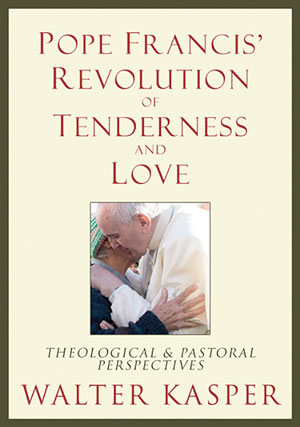Fourth in a series
What has made Cardinal Walter Kasper’s “Pope Francis’ Revolution of Tenderness and Love” (New York: Paulist Press, 2015, pp. 117, $16.95) especially interesting to me is that Cardinal Kasper seems to know the Holy Father’s theology and spiritual approach to problems so well. Reading the book, I have had the impression that I am gaining an inside look into how Pope Francis thinks and how he looks at problems. For me, this makes Cardinal Kasper’s small volume something special.
One of the great influences on Pope Francis’ thinking was theologian Lucio Gera (1924-2012). Cardinal Kasper notes that when he was Archbishop Bergoglio, Pope Francis arranged to have Gera interred in the episcopal crypt of the Buenos Aires Cathedral to honor Gera as the father of Argentine theology. Cardinal Kasper writes the following:
“Lucio Gera, together with Gustavo Gutierrez, who is regarded as the father of liberation theology, and others took part in the conference in Petropolis in 1964 that had been convened by the Latin American Episcopal Conference (CELAM). It is regarded as the hour in which liberation theology was born. At this conference, Lucio Gera gave a paper on the theme ‘The Meaning of the Christian Message in the Context of Poverty and Oppression.’ This theme has become foundational for all forms of liberation theology. They all operate according to the method of see, judge act.” (p. 16)
When I first began teaching at St. John’s University, Jamaica, there was a course given by the theology department on liberation theology. At that time, some students misunderstood liberation theology. Because the course dealt with social conditions, some students thought it was a course in sociology instead of theology.
Perspective of the Poor
 I think that in some people’s minds liberation theology involves the embracing of Marxism. It does not. Marx was an atheist. A Catholic theology cannot be based on atheism. Liberation theology tries to look at Christian revelation from the perspective of the poor in order to see what light Christian revelation can shed on poverty.
I think that in some people’s minds liberation theology involves the embracing of Marxism. It does not. Marx was an atheist. A Catholic theology cannot be based on atheism. Liberation theology tries to look at Christian revelation from the perspective of the poor in order to see what light Christian revelation can shed on poverty.
Cardinal Kasper describes Argentine theology as a theology of the people and of culture. It seems to me that Pope Francis has been using the method of see, judge and act in his pontificate, and as Cardinal Kasper points out, the Holy Father starts not with an idea, but with reality.
The cardinal indicates that Pope Francis was also influenced by the German theologian, Romano Guardini. I was delighted to learn this as Guardini was a popular writer among seminarians when I was in the major seminary.
On Pope Francis’ theology, Cardinal Kasper offers the following statement:
“…he wants to shed light on the situation of the church and of Christians in the contemporary world from the perspective of the gospel. In so doing, Christian faith is not an ideology that tends to explain everything; it is not to be compared with a floodlight that illuminates the entire path of our life. Rather, it is like a lantern that shines for us on the path of life as far as we ourselves are advancing. It is a forever surprising, never exhaustible message of joy.” (p. 21)
What especially appeals to me in Pope Francis’ outlook on reality under the light of the Gospel is his emphasis on joy. It is no accident that he called his Apostolic Exhortation “The Joy of the Gospel.” He does not present Christian life as a life of great burden. Rather, he presents it – even though it involves sacrifices, at times great sacrifices – as a life that should lead to profound joy.
Living as a Christian should lead to a profound joy that can co-exist with sacrifices, crosses and suffering. Joy should be the “bottom line,” the ultimate and deepest reaction to the Gospel.
Father Robert Lauder, philosophy professor at St. John’s University, Jamaica, is the author of “Pope Francis’ Spirituality and Our Story” (Resurrection Press).
